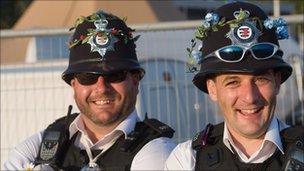Gangs 'to target small music festivals'
- Published

Despite the worries, crime rates at festivals remain low
Organisers of smaller UK music festivals have been warned that criminal gangs may target their events next summer.
Successful policing at larger events may drive criminals to festivals with less security, industry figures said.
Theft from tents and pick-pocketing remained the most common on-site crimes, delegates at the UK Festival Awards Conference in London were told.
But the conference also heard that the overall festival crime rate was low.
Police forces and promoters of major events have been working more closely to share information, said Jim King of Loud Sound - the company behind Rockness and a member of the Association of Independent Festivals.
This had helped identify groups and prevented them from entering the site, or to making arrests, he added.
"The conscious effort to get police and promoters in one room and look at tackling this has been incredibly successful," Mr King said, adding that negative headlines about crime were bad for business, as they risked deterring parents from allowing their children to attend events.
And a director at the Iridium Consultancy, Reg Walker, said he was now worried that criminals were going "to get pushed to the smaller festivals, with less security".
"Small festivals do not have specially trained officers they can call on and have very low, or sometimes no level of policing at all."
He added that many smaller festivals were boutique rather than mass-market events and had a "highly affluent demographic" which may make them appealing to criminals.
'Tough'
Detective Constable Kevin Walker of Leicestershire police told the conference that he was beginning to see evidence of smaller events being targeted - citing one recent small-scale event where pickpockets had taken more than 40 mobile phones from customers.

Now policing of big festivals like Glastonbury has improved criminals may target smaller events
And after years of being crime free, the 7,000 capacity End of the Road Festival was targeted by a gang of criminals at this year's event - with thefts reported from about 100 tents.
Organiser Sofia Hagberg said the criminals had travelled to the North Dorset site from Manchester, and were well-known to Greater Manchester Police.
Some of the goods were recovered and three arrests were made at the site, she added.
"They had bought their tickets, they looked like regular festival-goers, so it was hard for us," Ms Hagberg said.
"We spend as much as we can on security, but when you are a small festival on a small budget it's tough."
The festival offered a free lock-up for valuables - which had seen 9,000 transactions over the weekend - and customers were told about the facility on arrival, said the event's production manager Chris Tarren.
"And we have an older crowd, who are generally very aware and sensible with their valuables," he added
However, Mr Tarren conceded that the way next year's event was policed would have to be reviewed.
The Green Man festival attracts more than 15,000 people to the Brecon Beacons in Wales, but has no police presence - instead using a combination of stewards and security teams.
Organiser Fiona Stewart told the BBC that the event had not had one recorded incident of theft from a tent since it began in 2003.
But she added: "Unfortunately, it'll happen one day, but our security teams are incredibly good."
Low crime rates
Loud Sound's Jim King said that the risk of smaller festivals having to focus more on crime was a serious issue for the festival business as a whole.
"There are barriers to entry if you're starting a festival and one of these is the cost of policing," he said.
"Small festivals are the breeding ground of the industry. It's where much of the creativity comes from and they need to be protected."
However, Reg Walker said that, overall, crime rates at music festivals remained extremely low.
"Statistically, you are still much safer at a music festival than you are walking down the High Street," he said.
- Published18 October 2010